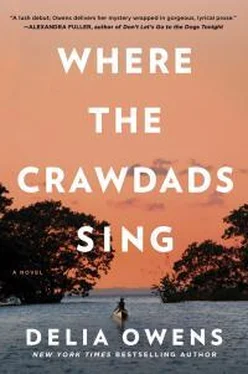“Thank you, Tim. No more questions.”
Eric walked up close to the witness stand. “Tim, even if you could not identify that boat, or who exactly was in it, do you agree that a rig about the same size and shape as Miss Clark’s boat was headed toward the Barkley Cove Fire Tower at approximately 1:45 A.M. the night Chase Andrews died at the fire tower around that time?”
“Yes, I can say the boat was a similar shape and size as Miss Clark’s.”
“Thank you very much.”
On redirect, Tom rose and spoke from where he stood. “Tim, to confirm, you testified that you have recognized Miss Clark in her boat many times, but on that evening, you saw nothing at all to identify that boat or boater to be Miss Clark in her rig. Correct?”
“Correct.”
“And can you tell us, are there very many boats the same size and shape as Miss Clark’s boat operating in this area?”
“Oh yes, hers is one of the most common types of boat around. There’s lots of boats just like hers operating here.”
“So the boater you saw that night could have been any number of other persons in a similar boat?”
“Absolutely.”
“Thank you. Your Honor, the defense rests.”
Judge Sims said, “We’ll recess for twenty minutes. Court dismissed.”
• • •
FOR HIS CLOSING, Eric wore a tie with wide gold and burgundy stripes. The gallery was quietly expectant as he approached the jury and stood at the railing, passing his eyes deliberately from one to the next.
“Ladies and gentlemen of the jury, you are members of a community, of a proud and unique town. Last year you lost one of your own sons. A young man, a shining star of your neighborhood, looking forward to a long life with his beautiful . . .”
Kya barely heard him as he repeated his account of how she murdered Chase Andrews. She sat, elbows on the table, her head in her hands, catching only fragments of his discourse.
“. . . Two well-known men in this community saw Miss Clark and Chase in the woods . . . heard her saying the words I will kill you! . . . a red wool cap that left fibers on his denim jacket . . . Who else would want to remove that necklace . . . you know these currents and winds can drastically increase the speed . . .
“We know from her lifestyle that she is very capable of boating at night, of climbing the tower in the dark. It all fits together like clockwork. Every single move she made that night is clear. You can and must find that the defendant is guilty of first-degree murder. Thank you for doing your duty.”
• • •
JUDGE SIMS NODDED AT TOM, who approached the jury box.
“Ladies and gentlemen of the jury, I grew up in Barkley Cove, and when I was a younger man I heard the tall tales about the Marsh Girl. Yes, let’s just get this out in the open. We called her the Marsh Girl. Many still call her that. Some people whispered that she was part wolf or the missing link between ape and man. That her eyes glowed in the dark. Yet in reality, she was only an abandoned child, a little girl surviving on her own in a swamp, hungry and cold, but we didn’t help her. Except for one of her only friends, Jumpin’, not one of our churches or community groups offered her food or clothes. Instead we labeled and rejected her because we thought she was different. But, ladies and gentlemen, did we exclude Miss Clark because she was different, or was she different because we excluded her? If we had taken her in as one of our own—I think that is what she would be today. If we had fed, clothed, and loved her, invited her into our churches and homes, we wouldn’t be prejudiced against her. And I believe she would not be sitting here today accused of a crime.
“The job of judging this shy, rejected young woman has fallen on your shoulders, but you must base that judgment on the facts presented in this case, in this courtroom, not on rumors or feelings from the past twenty-four years.
“What are the true and solid facts?” Just as with the prosecution, Kya’s mind caught only snippets. “. . . the prosecution has not even proved that this incident was indeed a murder and not simply a tragic accident. No murder weapon, no wounds from being pushed, no witnesses, no fingerprints . . .
“One of the most important and proven facts is that Miss Clark has a sound alibi. We know she was in Greenville the night Chase died . . . no evidence that she dressed as a man, bused to Barkley . . . In fact, the prosecution has failed to prove that she was in Barkley Cove that night at all, failed to prove that she went to the tower. I say again: there is not one single piece of evidence that proves Miss Clark was on the fire tower, in Barkley Cove, or killed Chase Andrews.
“. . . and the skipper, Mr. O’Neal, who has operated his own shrimp boat for thirty-eight years, testified that it was too dark to identify that boat.
“. . . fibers on his jacket, which could have been there for four years . . . These are uncontested facts . . .
“Not one of the witnesses for the prosecution was sure of what they saw, not one. Yet in her defense, every witness is one hundred percent certain . . .”
Tom stood for a moment in front of the jury. “I know most of you very well, and I know you can set aside any former prejudices against Miss Clark. Even though she only went to school one day in her life—because the other children harassed her—she educated herself and became a well-known naturalist and author. We called her the Marsh Girl; now scientific institutions recognize her as the Marsh Expert.
“I believe you can put all of the rumors and tall tales aside. I believe you will come to a judgment based on the facts you heard in this courtroom, not the false rumors you have heard for years.
“It is time, at last, for us to be fair to the Marsh Girl.”
54. Vice Versa
1970
Motioning toward mismatched chairs in a small conference room, Tom offered seats to Tate, Jodie, Scupper, and Robert Foster. They sat around the rectangular table, stained with coffee-mug circles. The walls were two tones of flaking plaster: lime green around the top, dark green around the bottom. An odor of dankness—as much from the walls as from the marsh—permeated.
“You can wait in here,” Tom said, closing the door behind him. “There’s a coffee machine down the hall across from the assessor’s, but it’s not fit for a three-eyed mule. The diner has okay coffee. Let’s see, it’s a little after eleven. We’ll make a plan for lunch later.”
Tate walked to the window, which was crisscrossed with a mesh of white bars, as if other verdict-waiters had tried escape. He asked Tom, “Where’d they take Kya? To her cell? Does she have to wait in there alone?”
“Yes, she’s in her cell. I’m going to see her now.”
“How long do you think the jury will take?” Robert asked.
“It’s impossible to say. When you think it’ll be quick, they take days, and vice versa. Most of them have probably already decided—and not in Kya’s favor. If a few jurors have doubts and try to convince the others that guilt has not been proven definitively, we have a chance.”
They nodded silently, weighed down by the word definitively , as though guilt had been proven, just not absolutely.
“Okay,” Tom continued. “I’m going to see Kya and then get to work. I have to prepare the appeals request and even a motion for a mistrial due to prejudice. Please keep in mind, if she’s convicted, this is not the end of the road. Not by any means. I’ll be in and out, and I’ll certainly let you know if there’s any news.”
“Thanks,” Tate said, then added, “Please tell Kya we’re here, and will sit with her if she wants.” This, though she had refused to see anyone but Tom for the last few days and almost no one for two months.
Читать дальше











